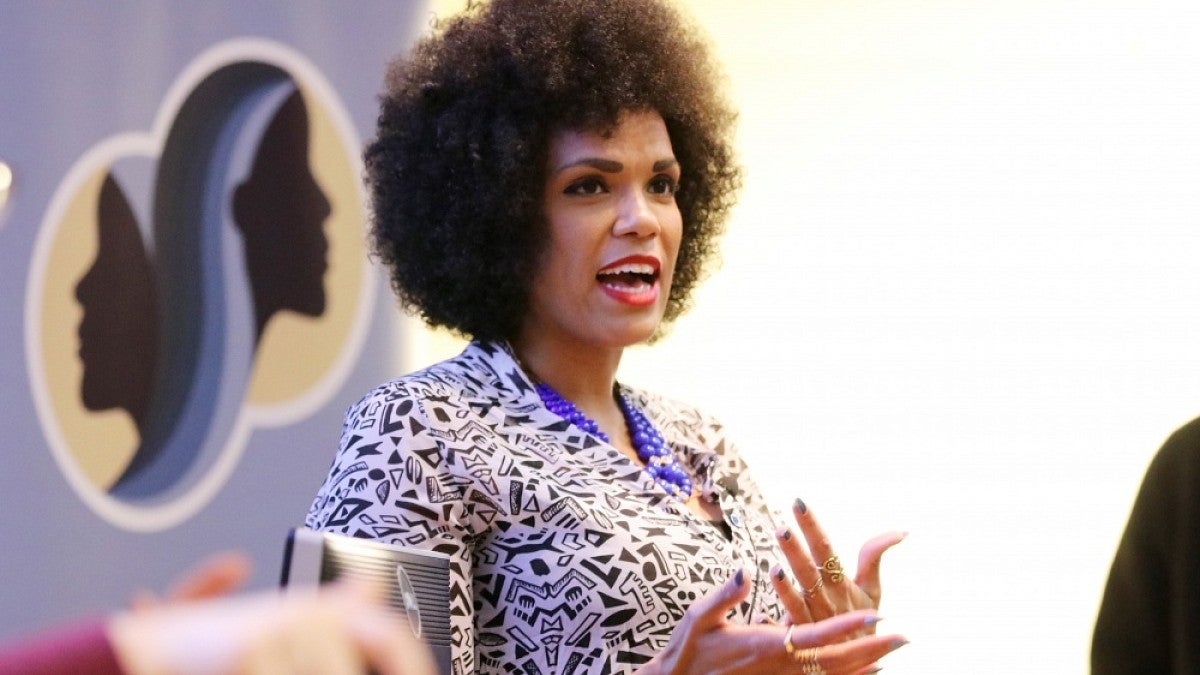The last time Walidah Imarisha spoke on the UO campus, the audience overflowed a large Lillis Hall classroom.
That was October 2017. Imarisha is again bringing an interactive lecture to campus, and the Center for the Study of Women in Society is going bigger.
Her visit will be held in an even larger lecture hall, Room 156 in Straub Hall. It takes place Wednesday, Feb. 27, from 4:30 to 6 p.m. and is free and open to the public. Imarisha will discuss “Why Aren’t There More Black People in Oregon?: A Hidden History.”
Imarisha shares information on black history in Oregon through the historical timeline she developed during years as a public scholar facilitating programs throughout the state under the sponsorship of the Oregon Humanities’ Conversation Project.
She grew up on military bases overseas, largely in Germany, and was 13 years old when her mother moved them to Springfield. Imarisha was one of seven black students in Springfield High School, graduating at age 16.
At the time, students of color were experiencing a lot of violence in places where Imarisha spent time, but she was fortunate to have a guidance counselor who steered her toward Howard Zinn’s “A People’s History of the United States,” which helped her “put it into perspective” and steered her toward social justice organizations.
Winner of a 2017 Oregon Book Award for creative nonfiction for “Angels with Dirty Faces: Three Stories of Crime, Prison, and Redemption,” Imarisha also has edited two anthologies, authored a poetry collection and is currently working on an Oregon black history book. She has taught in Stanford University’s Program of Writing and Rhetoric, Portland State University’s Black Studies Department, Oregon State University’s Women Gender Sexuality Studies Department, and Southern New Hampshire University’s English Department.
In an interview for the 2018 CSWS Annual Review, Imarisha was asked what it is that keeps drawing her back to Oregon, once called the skinhead capital of the country, given its history of entrenched racism. She responded that she thinks it’s the community she built as an undergraduate at Portland State University. And then she added:
“Once I started doing the Oregon black history work, the resistance and resilience of communities of color here, and for me personally especially the black community, is something that has called me back, because I think how hard people fought to be here. I think about folks hearing, ‘We will whip you, every six months, thirty-nine lashes, if you are black, until you leave this territory.’
“And 124 black folks heard that, and said, ‘We’re staying then.’ And the courage and determination and sheer stubbornness that must have taken. And if they hadn’t done that, I would not be here. There would be no people of color in Oregon, as it was planned. It would be the racist, white utopia free of people of color that was the founding notion of it.”
Her talk is co-sponsored by the Division of Equity and Inclusion, Division of Undergraduate Studies, UO Libraries and the departments of English, ethnic studies, history and philosophy.
For more information on Imarisha, visit the Center for the Study o Women in Society website or read the full interview with her. The black history slides developed by Imarisha can be found in the summer 2013 edition of Oregon Humanities magazine under the heading “A Hidden History.”


